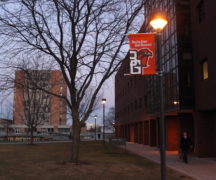By DAVID DUPONT
BG Independent News
When the BGSU Faculty Senate met Tuesday afternoon all involved had an eye on Columbus.
Last week the House approved Senate Bill 1, a broad overhaul of higher education. The bill was now in the Senate with everyone anticipating final action soon.
On Wednesday, the senate voted to concur with changes made to the legislation by the House and send the bill on to Gov, Mike DeWine.
The 20-11 passage, according to Ohio Capital Journal, was along party lines with only two Republicans voting against it, State Sen. Louis W. Blessing III, of Colerain Township, and State Sen. Thomas F. Patton, of Strongsville. State Sen, Theresa Gavarone, a Republican from Bowling Green voted with the majority. State Rep. Haraz Ghanbari, a Republican from Perrysburg voted for the bill in the House.
[RELATED: Ohio higher ed overhaul to ban diversity efforts and regulate classroom discussion heads to governor]
The governor is expected to sign the bill into law.
After it is signed, BGSU and other state universities will have 90 days to implement most of the changes.
Faculty across the state have spoken loudly against the legislation, which among other aspects limits what faculty unions can bargain for as well as limiting their ability to strike.
Bill Albertini speaking for the faculty union said while it’s likely DeWine will sign the bill “the fight is not over.”
He urged faculty and others to contact the governor to express their opposition to SB1.
The bill was passed despite “vigorous opposition” from faculty, students and other Ohioans.
“We are deeply disappointed that those elected to represent Ohioans passed bills that would weaken higher education in Ohio, take the curriculum away from faculty control, curtail academic freedom, and attack public employee unions rather than work on issues that Ohioans care about.”
In his remarks early in the meeting BGSU President Rodney Rogers said the bill “impacts virtually every area of the university in a variety of ways” from terms and “training” of trustees to adding a question to student evaluations.
Every single division of the institution is impacted in some way, Rogers reiterated.
“Clearly the bill will add some administrative costs,” he added.
Rogers reiterated the importance of shared governance with the administration and faculty both involved. Some issues involving faculty will now have to be returned to the charter, rather than in the bargaining agreement.
He cautioned against “fighting among ourselves.”
There will be “hard conversations working through these provisions,” Rogers said. “We can absolutely protect academic freedom. We can absolutely support students. We have to recommit ourselves to shared governance and work together.”
Rogers said “I would urge us to think about that. We absolutely want to lean into and make sure we’re achieving .”
The bill requires that “all faculty, staff, and students should be held to equal standards and provide every individual with equality of opportunity in regards to the individual’s race, ethnic identity, religion, sex, sexual orientation and gender expression.”
Rogers spoke in support of the university’s Division of Inclusion and Belonging. That division’s work is focused supporting students, faculty, and staff. “We will be working through a variety of scenarios to try to best to comply with the law.”
He sees nothing in the bill that stops BGSU from “supporting students regardless of their backgrounds.
“We will support them so they can be successful here, that they can find community and belong. We will provide them the necessary support to be successful.”
After casting a vote in favor of SB1 in February, Gavarone issued a statement that asserted: “This bill protects the free speech rights for all students as well as professors and administrators. SB 1 ensures that parents and students who pay tuition to a university in advance don’t lose that investment due to a faculty strike outside their control. SB 1 increases transparency by requiring public disclosure of course syllabi and university financial plans, and it explores measures to reduce tuition costs for students and families.”
Interim Provost Glenn Davis said other universities have made preemptive changes. “BGSU has very intentionally taken a moderate approach to implementation of the bill. …We didn’t take larger steps before we knew what the bill would really say.” Now the university will pull together working groups to implement the requirements of the legislation.





